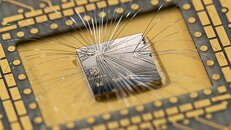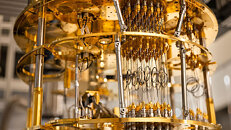T0@st
News Editor
- Joined
- Mar 7, 2023
- Messages
- 2,780 (3.69/day)
- Location
- South East, UK
| System Name | The TPU Typewriter |
|---|---|
| Processor | AMD Ryzen 5 5600 (non-X) |
| Motherboard | GIGABYTE B550M DS3H Micro ATX |
| Cooling | DeepCool AS500 |
| Memory | Kingston Fury Renegade RGB 32 GB (2 x 16 GB) DDR4-3600 CL16 |
| Video Card(s) | PowerColor Radeon RX 7800 XT 16 GB Hellhound OC |
| Storage | Samsung 980 Pro 1 TB M.2-2280 PCIe 4.0 X4 NVME SSD |
| Display(s) | Lenovo Legion Y27q-20 27" QHD IPS monitor |
| Case | GameMax Spark M-ATX (re-badged Jonsbo D30) |
| Audio Device(s) | FiiO K7 Desktop DAC/Amp + Philips Fidelio X3 headphones, or ARTTI T10 Planar IEMs |
| Power Supply | ADATA XPG CORE Reactor 650 W 80+ Gold ATX |
| Mouse | Roccat Kone Pro Air |
| Keyboard | Cooler Master MasterKeys Pro L |
| Software | Windows 10 64-bit Home Edition |
Earlier this week Microsoft revealed its roadmap for the building of a proprietary quantum supercomputer. The company's research department has been making progress with the elusive building blocks of topological qubits over a number of years. Microsoft's VP of advanced quantum development - Krysta Svore - has informed TechCrunch that their team anticipates it taking under ten years to construct and complete a quantum supercomputer utilizing qubits, with a view to perform a reliable one million quantum operations per second. Svore stated: "We think about our roadmap and the time to the quantum supercomputer in terms of years rather than decades."
Majorana-based qubits are extremely difficult to create, but worth the effort due to being inherently stable. Microsoft's quantum team has dedicated itself to hitting a first milestone, with more devices developed and data collected since last year's major breakthrough. Svore reiterates: "Today, we're really at this foundational implementation level...We have noisy intermediate-scale quantum machines. They're built around physical qubits and they're not yet reliable enough to do something practical and advantageous in terms of something useful. For science or for the commercial industry. The next level we need to get to as an industry is the resilient level. We need to be able to operate not just with physical qubits but we need to take those physical qubits and put them into an error-correcting code and use them as a unit to serve as a logical qubit." Svore's team is focusing more on the building of hardware-protected qubits, that are tiny - "smaller than 10 microns on a side" with performance of one qubit operation in less than a microsecond.


View at TechPowerUp Main Site | Source
Majorana-based qubits are extremely difficult to create, but worth the effort due to being inherently stable. Microsoft's quantum team has dedicated itself to hitting a first milestone, with more devices developed and data collected since last year's major breakthrough. Svore reiterates: "Today, we're really at this foundational implementation level...We have noisy intermediate-scale quantum machines. They're built around physical qubits and they're not yet reliable enough to do something practical and advantageous in terms of something useful. For science or for the commercial industry. The next level we need to get to as an industry is the resilient level. We need to be able to operate not just with physical qubits but we need to take those physical qubits and put them into an error-correcting code and use them as a unit to serve as a logical qubit." Svore's team is focusing more on the building of hardware-protected qubits, that are tiny - "smaller than 10 microns on a side" with performance of one qubit operation in less than a microsecond.


View at TechPowerUp Main Site | Source





